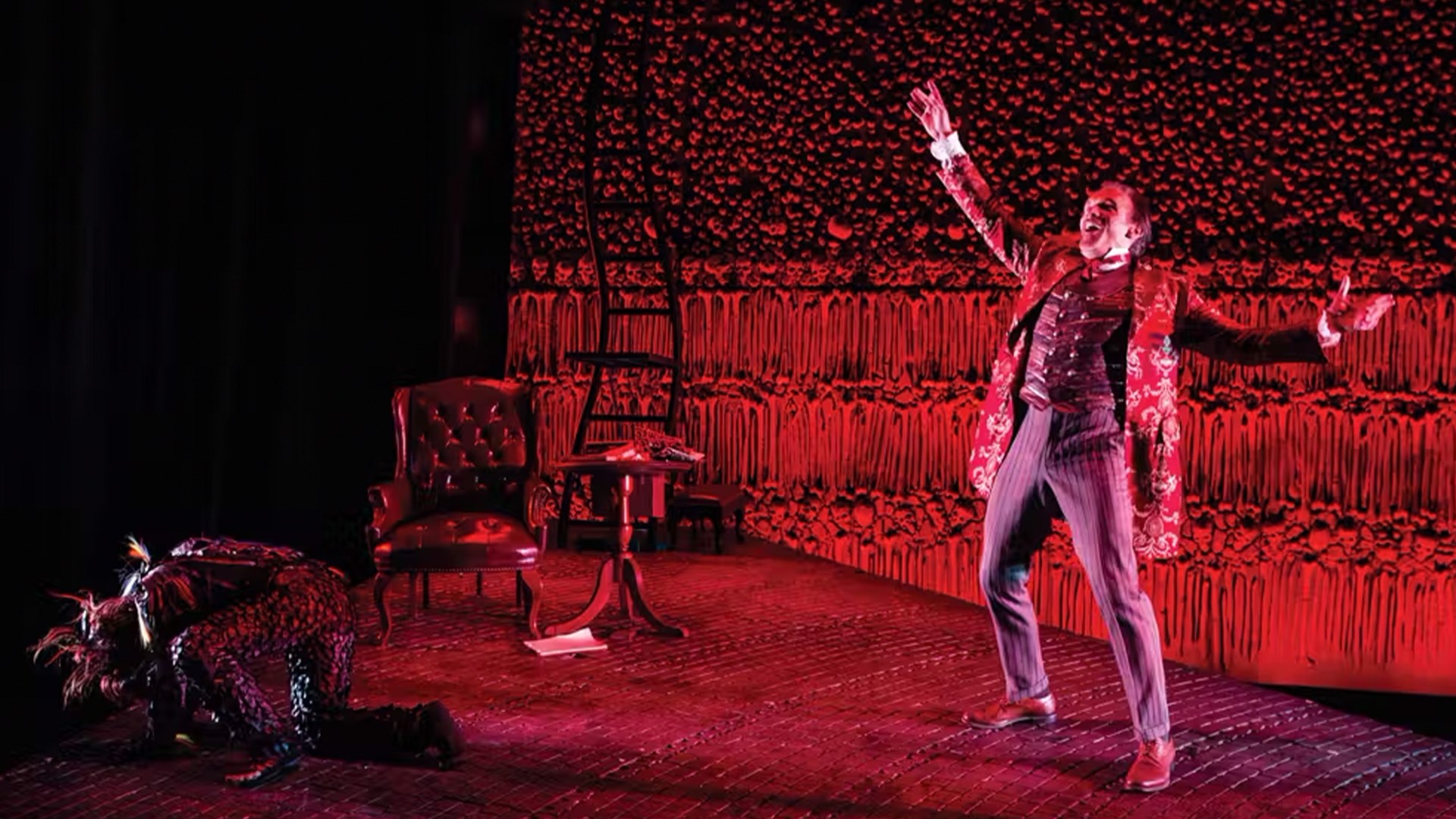If anyone expected a Halloween gimmick, they were disappointed.
I can see how some theatergoers might have been confused. It’s October, after all. Marketing materials for The Screwtape Letters, a theatrical adaptation of C. S. Lewis’s epistolary novel currently on a national tour, show a sinister man cast in red before a wall of skulls and femurs.
Last weekend, the California Theatre staged the two-actor play about demons and hell, complete with a glowing red mailbox, echo effects, vomit, and creepy lighting. Next weekend, the venue will host Symphonic Spooktacular: “Bewitching Broadway.” If you didn’t know the Screwtape book, you’d be forgiven for thinking this was similar spooky-season fare.
But frights weren’t the point of this show. At least, not the jump scare kind. Fear of God? For sure. And I think the audience in San Jose’s gilded California Theatre mostly knew that’s what they were in for. That is, I think they were mostly Christians. At least if the laughs were any indication.
The packed house for the 7 p.m. showing laughed at jokes about what demons eat—“municipal authority with graft sauce,” “a lukewarm casserole of adulterers.” They laughed at how humans get led astray from their faith: sometimes by pastors, sometimes by sex, sometimes by friends they want to impress, sometimes by “moderation in all things.”
They did not laugh about the terrifying prospect of respectable people “progressing quietly and comfortably” toward hell. That warning they took seriously. They did not laugh (well, maybe they gave a knowing chuckle) at veiled Jesus references.
All the play’s lines, funny or otherwise, come from C. S. Lewis’s original text, first published in 1942. (The show excerpts 24 of the 31 letters in his novel.) Screwtape takes place on one spare set—essentially an armchair and a desk—with dialogue recited by one character, the senior demon Screwtape, who dictates to his pantomiming minion, Toadpipe.
Screwtape wears a waistcoat and a smoking jacket. Toadpipe wears a scaly metallic onesie. Screwtape speaks in a posh British accent. Toadpipe babbles and hisses. The addressee of Screwtape’s letters—his nephew Wormwood, a junior demon—is never shown. Nor is the human “patient” that Wormwood is attempting to tempt under his uncle’s tutelage.
It’s hard to sustain 90 minutes of monologue, and my attention drifted at times. But Screwtape (Brent Harris) does an admirable job with what he’s given, introducing elements of physical comedy to break up the staging and varying his delivery as the show goes on. (By the end, he’s despairing, hair standing on end, at the prospect of the patient’s salvation.)
His role necessitates dramatic flair, and he provides—though sometimes his delivery is too exaggerated to be effective. Sometimes, it’s just weird. More laughs came in response to his thrusting and sex sounds, which accompanied an already-odd passage from Lewis about fashionable female body types. That passage is unobjectionable in its takeaway—it’s a warning about pornographic desires and the pressure they put on women—but it also shows its age, and Harris’s interpretation doesn’t help its cause.
More so than the play’s challenging structure, whoever takes on the character of Screwtape has to contend with the production’s purpose. Fun? Sure. But this is also an altar call.
The “justice of Hell is concerned only with results,” whereas the Enemy, “heretical” as it is to admit, is motivated by love, proclaims the beleaguered uncle. “Real life” may seem to be lunch and the newspaper—but there’s actually nothing more real than this world of heaven and hell, powers and principalities. “We want cattle who can finally become food,” sneers Screwtape. “He wants servants who can finally become sons.”
Preaching is the point. Screwtape’s theatrical adaptation has been put on for almost two decades now by Fellowship for Performing Arts, a “not-for-profit New York City–based production company producing theatre and film from a Christian worldview” for “intellectually and spiritually diverse audiences.” (This tour will continue along the West Coast before visiting Arizona, Kentucky, Ohio, and Michigan.)
Its other productions have included The Great Divorce and Paradise Lost as well as stagings of Genesis and Mark’s Gospel. Most theater groups don’t have a statement of faith. FPA’s is the Nicene Creed. No wonder that the staging is barebones and the casting is slim. The point isn’t a big-budget production but something streamlined that can carry the gospel to as many theaters as possible.
The company’s founder, Max McLean, played Screwtape himself for many years. (CT profiled him in 2012.) Right now, McLean is acting in a show he wrote called C.S. Lewis Onstage: Further Up & Further In and working on a Screwtape movie.
During his post-show talk in San Jose, as the audience effused praise for what they’d just seen, McLean said that the Screwtape show had been convicting and even life-changing for some viewers, judging by feedback he’s received. The point of the production, he reiterated, was for viewers to understand the “wiles of the devil” and to “put on the armor of God.”
Some elements of the show are alarming—like when Screwtape, illumined in icy blue light, mocks a human who realizes too late that he wasted his days on earth; or when he describes the noisiness of hell to a bashing soundtrack, as compared to the silence and music of being with the Lord. Those vignettes were sobering for me, a Christian. If any agnostics in the audience saw them, I bet they had a reaction too.
But most viewers, I’d wager, weren’t skeptics but believers—several of whom, like me, have read the original book. (There was a show of hands during the talk.) We were the in-group, laughing cheerily at cracks at celebrities and sexy temptresses and selfish people who are too particular about their tea and toast, giddy when the demons gag on words like prayer and love. Ha! Take that! We wear the armor of God! “Mm,” murmured the woman next to me as she watched, in the same way some congregants hum approval along to sermons.
Ultimately, it’s C. S. Lewis himself who sets us straight. Through the words of Screwtape, Lewis warns of worldly vice and snobbery but also of Pharisaic hubris, spiritual pride, an “inner ring of trained theocrats.” At least on stage, it’s hard for those warnings to land as powerfully as the more theatrical jabs at hourglass silhouettes and Madonna. But they’re certainly in the original text.
In the novel, which I read again post-curtain, a preface caveats that the sinful humans Screwtape mocks are themselves not given “wholly just” portrayals. “There is wishful thinking in Hell as well as on Earth,” Lewis warns. Nobody is safe from the snares of Satan—but also, nobody is outside of the grace of God.


















